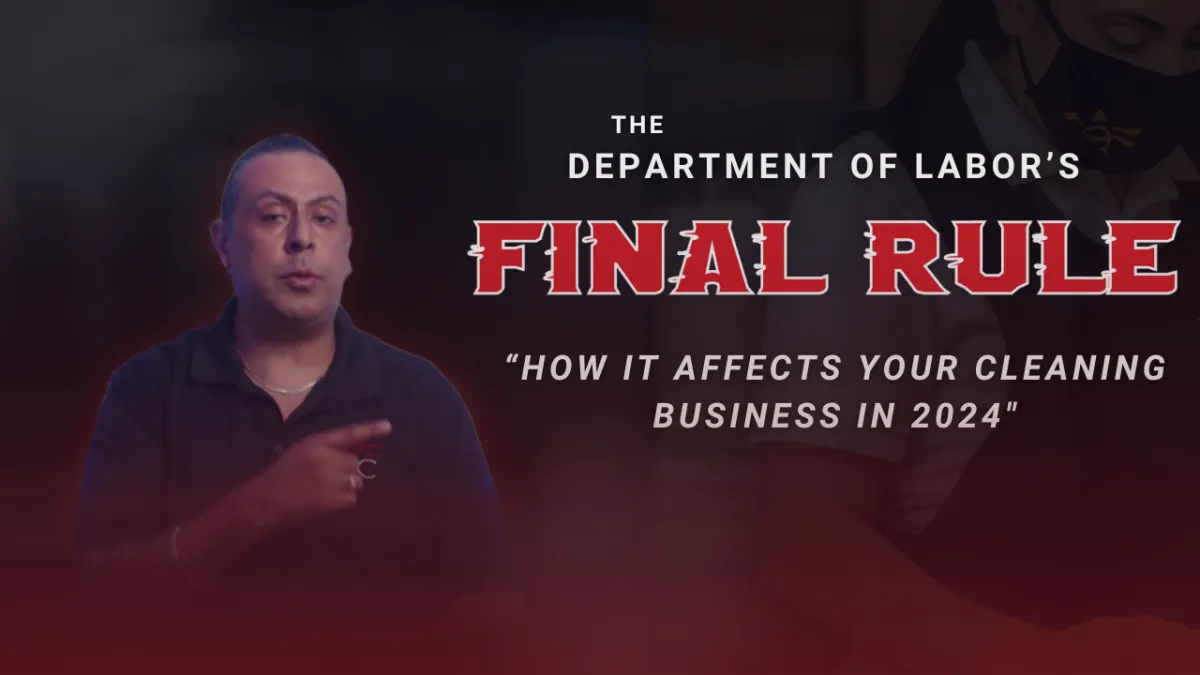Insights from 7Figure Cleaners
Embark on a journey to entrepreneurial mastery with 'Insights' – your compass to navigating the intricate world of cleaning business success. Here, every article is a stepping stone towards your seven-figure goal, providing the wisdom and strategies you need to chart a clear course to the top.
Categories
Recent Articles

The U.S. Department of Labor's 'New Rule' Changes Things for Cleaning Business Owners - What You Need to Know in 2024
The U.S. Department of Labor's 'New Rule' Changes Things for Cleaning Business Owners
What You Need to Know in 2024
Do you currently have Independent Contractors for cleaners?
If you answered yes, or are getting ready to launch your cleaning business and planning to use subcontractors, make sure you this article all the way through or watch the video to avoid getting penalized in 2024.
But first, understand that I am not a legal professional and this is not legal advice. If you have questions, please make sure you consult a legal professional in your area. Ok, let’s continue!
Hola amigos, Cristobal Mondragon here with 7Figure Cleaners. I own a cleaning company called Bumble Bee Cleaning and understand the importance of staying compliant when it comes to correctly classifying our cleaners.
In fact, many of you already know that I was fined after my first year in business for misclassifying my cleaners. Up until that point, I had no clue this was even a thing and that’s probably true for many new cleaning owners out there.
After reading this article, you’ll have a better understanding of both Contractors and Employees and you’ll be informed about the new rule that was just passed, that goes into effect on March 11th, 2024.
If you find value in this content, you may wish to join our 7FC program where you can unlock weekly coaching calls, access to all of our online courses for the cleaning industry, and access to our private community.
Ok, let’s dive in!
It’s helpful to understand why this is a big deal in the first place. Many cleaning business owners typically have a reason as to why they decide to go with Contractors over Employees, or vice versa.
Just in case you’re not familiar with the lingo, a Contractor tends to go by many different names in the industry.
Some simply call them Contractors while others use words like:
Independent contractors
Subcontractors
1099’s
Gig workers
The list goes on...
They’re all referring to the same type of worker. Contractors, just so you know, work WITH the business, not FOR it.
On the other side, there are employees. Employees are sometimes referred to as W2’s and they actually work FOR the business.
In case you’re wondering, 1099’s and W2’s are just different tax forms that are sent to the Contractors and Employees, respectively, come tax time.
It’s best to think of Employees as workers FOR the company and Contractors as separate businesses that can be hired to work WITH the company. Employees work for you and Contractors typically have other clients or jobs that they are working but can work with you on certain projects.
Now that you have a very basic understanding of the two, let’s talk about the historical benefits of working with Contractors.
In the cleaning industry, many business owners have historically chosen to work with Contractors for many reasons. In my experience, working with Contractors tends to be more cost effective for the business & easier to operate.
You simply pay them a percentage of each job and they pick up the jobs they want to work and you don’t have to worry about payroll taxes, workers compensation insurance, sick pay and other expenses that come along with Employees.
The downside has always been control. It can be difficult to control Contractors since they are their own business and legally, you aren’t supposed to tell them how to do their jobs or provide them with supplies.
This was a highly lucrative model for both the company and the contractors. The extra money that would have gone to payroll taxes, workers comp, was essentially split between the company and the contractors. In my experience, cleaners that were Contractors were happy because they controlled their own schedule, picked up whatever jobs they wanted, and were paid way more than they were as a traditional hourly employee.
Now let’s go over the new rule and how it changes things.
The new Department of Labor rule which some are referring to as the “Final Rule,” was passed a few days ago and goes into effect March 11th, 2024.
This new rule is changing the game in how workers are classified under the Fair Labor Standards Act or FLSA.
This new rule replaces the previous 2021 guidelines & is designed to reduce the misclassification of employees as independent contractors.
There are key elements to this new rule so let’s cover those now.
This new rule introduces a six-factor test that examines aspects like the potential for profit or loss, the level of investment from both worker and employer, the permanence of the work relationship, the degree of control by the employer, and the worker's skill and initiative. Unlike the past, no single factor is given more weight than the others, making this a balanced and comprehensive approach.
Let me break down this six-factor test & clarify each one a little more since this is really important for you to understand..
Factor #1: Profit or Loss Potential
This factor considers if a worker can make MORE money or LOSE money based on their work decisions.
Factor #2: Investment by Worker and Employer
This is like comparing who brings more supplies to a project – the worker or the company. It looks at the financial contributions both sides make.
Factor #3: Permanence of Work Relationship
Think of this like how long you’re part of a sports team. Is the work relationship more like a full season or just a single game?
Factor #4: Degree of Control by Employer
This factor looks at how much control the employer has over how, where, and when the work is done.
Factor #5: Worker’s Skill and Initiative
This factor checks if the worker uses their skills and effort to improve or if they just follow instructions.
Factor #6: Integral Part of Employer's Business
This is like determining if a worker is essential for the business to function. In other words, it checks if the worker’s role is a CORE part of the business.
Each factor is equally important in deciding if someone is an employee or a contractor, ensuring fairness. That’s what the new rule is all about.
As business owners, it’s our duty to stay on top of things like this and adjust accordingly so that we can continue operating our cleaning business.
I agree with the initiative of improving the conditions for workers across the U.S. I’m sure there were many instances where Contractors were being taken advantage of across numerous industries, not just the cleaning industry.
We should take care of our workers, not abuse them because without them, I’m sorry muchacho, you don’t have a cleaning business. Just remember that!
Now, let’s recap what we’ve learned.
We learned that the Department of Labor recently passed a new rule that aims to change the way workers are classified and provide clarification on who is considered a Contractor and who isn’t.
For cleaning business owners, this is big news. The way you classify your cleaners – whether as employees or independent contractors – can have significant legal and financial implications.
This rule is particularly crucial because it ensures workers get the rights and protections they deserve.
Now you’re probably wondering...
“what do I make of all this?”
While some would just spit out the facts without providing any recommendations or personal opinions, I promise NOT to do that to you!
So here’s what I think…
I think that this was a long time coming, especially as the gig economy continued to rapidly expand the way that it has been over the past several years.
Many cleaning businesses will be forced to change their business model and make a switch from Contractors to Employees to avoid being penalized for misclassifying the cleaners.
Payroll software companies like Gusto, will see a spike in sales since more businesses will be forced to use software to manage the complexities that come along with employee payroll.
Lastly, and most importantly, I DON’T think this is a bad thing and I DON’T believe that this will hurt your cleaning business, if you operate it correctly.
For context, I’ve always had a mix of employees and contractors in my cleaning company.
Now, however, we have completely made the switch to employees and our quality has gone up since we now have more control over our cleaners and how they clean, what supplies they use, and so on.
To wrap things up, I want to say that staying informed and compliant is key to the success of your business. Remember, this new rule is about ensuring fair play in the labor market and protecting workers' rights. As a business owner, adapting to these changes is important for your growth and stability.
If you found value in this article, consider joining 7Figure Cleaners so we can help you launch and grow your cleaning business faster than you thought possible.
Thanks for reading, adios amigos!
Cristobal Mondragon
LEARN MORE
COMPANY
RESOURCES
LEARN MORE
COMPANY
RESOURCES
Copyright © 2026 7Figure Cleaners, All Rights Reserved
Website proudly built with CleanCore™

